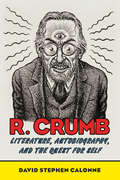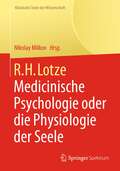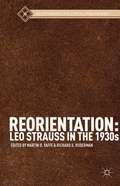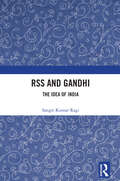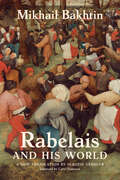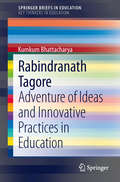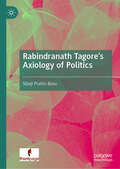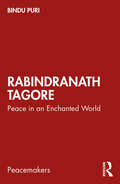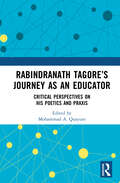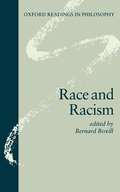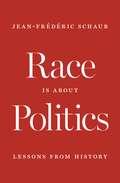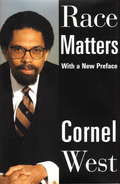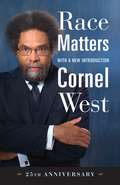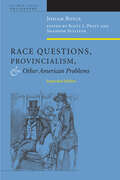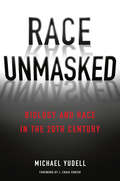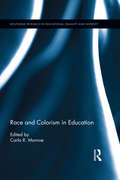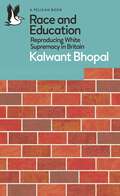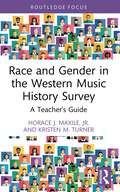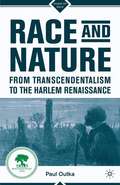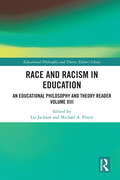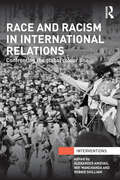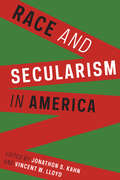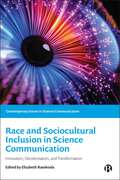- Table View
- List View
R. Crumb: Literature, Autobiography, and the Quest for Self
by David Stephen CalonneRobert Crumb (b. 1943) read widely and deeply a long roster of authors including Robert Louis Stevenson, Charles Dickens, J. D. Salinger, Jack Kerouac, William S. Burroughs, and Allen Ginsberg, as well as religious classics including biblical, Buddhist, Hindu, and Gnostic texts. Crumb’s genius, according to author David Stephen Calonne, lies in his ability to absorb a variety of literary, artistic, and spiritual traditions and incorporate them within an original, American mode of discourse that seeks to reveal his personal search for the meaning of life. R. Crumb: Literature, Autobiography, and the Quest for Self contains six chapters that chart Crumb’s intellectual trajectory and explore the recurring philosophical themes that permeate his depictions of literary and biographical works and the ways he responds to them through innovative, dazzling compositional techniques. Calonne explores the ways Crumb develops concepts of solitude, despair, desire, and conflict as aspects of the quest for self in his engagement with the book of Genesis and works by Franz Kafka, Jean-Paul Sartre, the Beats, Charles Bukowski, and Philip K. Dick, as well as Crumb’s illustrations of biographies of musicians Jelly Roll Morton and Charley Patton. Calonne demonstrates how Crumb’s love for literature led him to attempt an extremely faithful rendering of the texts he admired while at the same time highlighting for his readers the particular hidden philosophical meanings he found most significant in his own autobiographical quest for identity and his authentic self.
R.H. Lotze: Medicinische Psychologie oder die Physiologie der Seele (Klassische Texte der Wissenschaft)
by Nikolay MilkovOriginaltext mit philosophischen sowie historischen Kommentaren von Nikolay Milkov Als habilitierter Mediziner und Philosoph hat Rudolph Hermann Lotze durch seinen interdisziplinären Ansatz die Entwicklung der Psychologie im 19. Jahrhundert wie kein anderer geprägt. Im Unterschied zu anderen Wissenschaftlern der Zeit hat Lotze die neue Disziplin konsequent in enger Verbindung mit der Philosophie betrachtet, wie besonders in Medicinische Psychologie oder Physiologie der Seele (1852) deutlich wird. Dies bedeutete seine bewusste Abkehr von der Herangehensweise, die Psychologie ganz über experimentelle Untersuchungen und damit die Empirie zu definieren. Lotze scheute sich jedoch, diese entstehende Disziplin „philosophische Psychologie“ zu nennen, für ihn war sie nur physiologische Psychologie, herausgearbeitet mit Hilfe der Philosophie: Sie stellt Tatsachen fest und untersucht, wie Körper und Seele sich zueinander verhalten, tut dies jedoch nicht nur empirisch, sondern auch „metaphysisch“. In diesem Band wird Lotzes Originaltext untersucht, kommentiert und eingebettet in den soziokulturellen Hintergrund der Entstehungszeit, um einen tiefen, aber verständlichen Einblick in diesen Bereich der Psychologie zu geben.
REORIENTATION: LEO STRAUSS IN THE 1930s
by Martin D. Yaffe Richard S. RudermanThe first comprehensive effort to examine Strauss's astonishingly wide-ranging writings of the 1930s (some of which have only recently been made available to English-speaking readers, including several herein) with a view to their unifying theme of recovering classical political philosophy.
RSS and Gandhi: The Idea of India
by Sangit Kumar RagiThis book explores the relationship between Mohandas Karamchand Gandhi and the Rashtriya Swayamsevak Sangh (RSS) and discusses their relevance in India’s history and socio-political discourse. It looks back at the Indian independence movement and the key debates and issues that the country was confronted with in the early 1900s that continue to be relevant today. These include the practice of untouchability, tensions and conflicts between communities, the treatment of minorities and the marginalized, debates on the ideology of Hindutva, religious conversion, questions on the cultural and civilizational identity of India, and responses to Western modernity. This book discusses the ideological differences between Gandhi and the RSS while also focusing on areas where they converged. This book will be of interest to students, researchers, and academics working in the areas of modern Indian history, political science and philosophy. It will also be interesting to general readers curious about Gandhi and the RSS.
Rabelais and His World, a new translation
by Mikhail BakhtinA new and improved translation of Mikhail Bakhtin&’s classic and celebrated study of carnival.Mikhail Bakhtin&’s classic study of carnival, laughter, the grotesque, and medieval and renaissance folk culture has been the inspiration for countless new ideas in the humanities, in literature and the arts, and throughout human culture over the last half century.Rabelais and His World is a study devoted to French Renaissance writer François Rabelais, author of Gargantua and Pantagruel. Rabelais, Bakhtin argues, can only be properly understood against the backdrop of a millennia-old tradition of festivity and laughter, a tradition that included the Roman Saturnalia, medieval carnivals and feasts of fools, and Greek satyr plays and symposia from antiquity, as well as countless medieval works belonging to various smaller genres, circus shows, foul language and gesture, and much more.Bakhtin claims this tradition is united by the imagery it uses and the worldview it expresses. Its imagery is ambivalent. It effaces the boundaries between bodies, connects in one image birth with death, praise with invective. Its worldview is optimistic, defeating all fears and all official seriousness with laughter.The book&’s new translation is informed by recent scholarship on Bakhtin and contains the most extensive scholarly apparatus this book has received to date.
Rabindranath Tagore
by Kumkum BhattacharyaThis new addition to Springer's series on Key Thinkers in World Education tracks the intellectual and philosophical journey of a trail-blazing innovator whose ideas have fired the imaginations of progressive educationalists for almost a century. The volume's in-depth analysis of the educational philosophy of Bengali polymath Rabindranath Tagore offers an unrivalled focus on his highly influential views. Tagore--poet, internationalist, humanist, and the first non-European to win the Nobel Prize for literature--lived on the cusp of change between two momentous centuries in world civilization and foresaw the dissolution of colonialism and the globalization of culture. His ideas on education placed the creative individual at the centre of the quest for knowledge. Eschewing the artificial distinctions between elementary and higher learning, he advocated the importance of sowing the seed of humanism as early as possible, and fostering the individual's enjoyment of education as well as their courage to challenge conventions. In doing so, he anticipated the modern concern with critical thinking at the same time as he was encouraging independence of thought and action as a counter to colonial oppression and condescension. Concise yet thorough, this volume on one of the most original thinkers of the last century covers every aspect of Tagore's highly original educational philosophy.
Rabindranath Tagore's Axiology of Politics
by Sibaji Pratim BasuThis book revisits Rabindranath Tagore’s opinion and standpoints on constituent elements of politics from the stance of this marker––axiology, so that many well-known aspects of his thought may be seen in a different light. Among the Indian luminaries of the first half of the twentieth century, who were well-known both in the East and the West, Rabindranath Tagore (1861–1941) was arguably the most ‘gifted’ personality. Besides being the first non-European recipient of the Nobel Prize for Literature (1913) and the ‘ambassador’ of Indian culture to the West, he also wrote voluminous essays and letters on socio-political issues––engaged himself in various protests against the raj, as a pacifist in international arena and also as a polemical writer. Tagore is often described as the ‘conscience’ of the Indian nation. This book includes a long Tagore-Einstein conversation and a longish dialogue with H G Wells and his creative writings––poems, fictions, plays, and ‘personal’ letters––along with his direct political discourses to understand his Political Thought in a more comprehensive way.
Rabindranath Tagore: Peace in an Enchanted World (Peacemakers)
by Bindu PuriThis book explores Rabindranath Tagore’s distinctive argument for peace—in spiritual rather than in political—terms. Drawing on seminal texts by Tagore, the book presents the reader with a comprehensive overview of Gurudev’s seemingly contradictory notions of individual freedom, universal love for humanity and faith in the great Eastern nation. It underlines Tagore’s argument that peace could be best affected not by a league of nations but in educational institutions and that the “Religion of Man” lay in the truth of inter-relationships between human beings.A concise handy guide to Tagore’s philosophy, this book will be essential for students and scholars of philosophy, Tagore studies, peace and conflict studies and South Asian studies.
Rabindranath Tagore’s Journey as an Educator: Critical Perspectives on His Poetics and Praxis
by Mohammad A. QuayumThis book looks at Rabindranath Tagore’s, experiments and journey as an educator and the influence of humanistic worldviews, nationalism and cosmopolitanism in his philosophy of education. It juxtaposes the educational systems and institutions set up by the British colonial administration with Tagore’s pedagogical vision and schools in Santiniketan, West Bengal—Brahmacharya Asram (1901), Visva-Bharati University (1921) and Sriniketan Institute of Village Reconstruction (1922). An educational pioneer and a poet-teacher, Tagore combined nature and culture, tradition and modernity, East and West, in formulating his educational methodology. The essays in this volume analyse the relevance of his theories and practice in encouraging greater cultural exchange and the dissolution of the walls between classrooms and communities. This book will be useful for scholars and researchers of education, Tagore studies, literature, cultural studies, sociology of education, South Asian studies and colonial and postcolonial studies.
Race And Racism
by Bernard BoxillIn this volume, Boxill has collected a wide range of analytical writing that discusses the nature of these controversial ideas. With an introduction exploring the themes and conflicting ideas present in the book, and including a previously unpublished piece on the alleged racism of Immanuel Kant, this book will stimulate a critical understanding of the true meaning and far-reaching implications of an understanding of race and racism.
Race Is about Politics: Lessons from History
by Jean-Frédéric SchaubHow the history of racism without visible differences between people challenges our understanding of the history of racial thinkingRacial divisions have returned to the forefront of politics in the United States and European societies, making it more important than ever to understand race and racism. But do we? In this original and provocative book, acclaimed historian Jean-Frédéric Schaub shows that we don't—and that we need to rethink the widespread assumption that racism is essentially a modern form of discrimination based on skin color and other visible differences. On the contrary, Schaub argues that to understand racism we must look at historical episodes of collective discrimination where there was no visible difference between people. Built around notions of identity and otherness, race is above all a political tool that must be understood in the context of its historical origins.Although scholars agree that races don't exist except as ideological constructions, they disagree about when these ideologies emerged. Drawing on historical research from the early modern period to today, Schaub makes the case that the key turning point in the political history of race in the West occurred not with the Atlantic slave trade and American slavery, as many historians have argued, but much earlier, in fifteenth-century Spain and Portugal, with the racialization of Christians of Jewish and Muslim origin. These Christians were discriminated against under the new idea that they had negative social and moral traits that were passed from generation to generation through blood, semen, or milk—an idea whose legacy has persisted through the age of empires to today.Challenging widespread definitions of race and offering a new chronology of racial thinking, Schaub shows why race must always be understood in the context of its political history.
Race Matters
by Cornel WestThe fundamental litmus test for American democracy-its economy, government, criminal justice system, education, mass media, and culture-remains: how broad and intense are the arbitrary powers used and deployed against black people. In this sense, the problem of the twenty-first century remains the problem of the color line. --from the new PrefaceFirst published in 1993 on the one-year anniversary of the L.A. riots, Race Matters was a national best-seller, and it has since become a groundbreaking classic on race in America. Race Matters contains West's most powerful essays on the issues relevant to black Americans today: despair, black conservatism, black-Jewish relations, myths about black sexuality, the crisis in leadership in the black community, and the legacy of Malcolm X. And the insights that he brings to these complicated problems remain fresh, exciting, creative, and compassionate. Now more than ever, Race Matters is a book for all Americans, as it helps us to build a genuine multiracial democracy in the new millennium.From the Hardcover edition.
Race Matters, 25th Anniversary: With a New Introduction
by Cornel WestThe fundamental litmus test for American democracy-its economy, government, criminal justice system, education, mass media, and culture-remains: how broad and intense are the arbitrary powers used and deployed against black people. In this sense, the problem of the twenty-first century remains the problem of the color line. --from the new PrefaceFirst published in 1993 on the one-year anniversary of the L.A. riots, Race Matters was a national best-seller, and it has since become a groundbreaking classic on race in America. Race Matters contains West's most powerful essays on the issues relevant to black Americans today: despair, black conservatism, black-Jewish relations, myths about black sexuality, the crisis in leadership in the black community, and the legacy of Malcolm X. And the insights that he brings to these complicated problems remain fresh, exciting, creative, and compassionate. Now more than ever, Race Matters is a book for all Americans, as it helps us to build a genuine multiracial democracy in the new millennium.
Race Questions, Provincialism, and Other American Problems: Expanded Edition (American Philosophy)
by Josiah RoyceIn 1908, American philosopher Josiah Royce foresaw the future. Race questions and prejudices, he said, "promise to become, in the near future, still more important than they have ever been before." Like his student W. E. B. Du Bois in Souls of Black Folk (1903), Royce recognized that the problem of the next century would be, as Du Bois put it, "the problem of the color line." The twentieth century saw vast changes in race relations, but even after the election of the first African-American U.S. president, questions of race and the nature of community persist. Though left out of the mainstream of academic philosophy, Royce's conception of community nevertheless influenced generations of leaders who sought to end racial, religious, and national prejudice. Royce's work provided the conceptual starting place for the Cultural Pluralism movement of the 1920s and 1930s, and his notion of the Beloved Community influenced the work and vision of Martin Luther King, Jr., and the civil rights movement. Communities, whether they are understood as racial or geographic, religious or scientific, Royce argued, are formed by the commitments of individuals to causes or shared ideals. This starting point-the philosophy of loyalty-provides a means to understand the nature of communities, their conflicts, and their potential for growth and coexistence. Just as this work had relevance in the twentieth century in the face of anti-Black and anti-immigrant prejudice, Royce's philosophy of loyalty and conception of community has new relevance in the twenty-first century. This new edition of Royce's Race Questions, Provincialism, and Other American Questions includes a new introduction to Royce's philosophy of loyalty and the essays included in the volume, and a second introduction connecting Royce's work with contemporary discussions of race. The volume also includes six supplementary essays by Royce (unavailable since their initial publication before 1916) that provide background for the original essays, raise questions about his views, and show the potential of those views to inform other discussions about religious pluralism, the philosophy of science, the role of history, and the future of the American community.
Race Unmasked
by Michael YudellExploring the role of science in the making of America's modern racial calculus.
Race Unmasked
by Michael YudellExploring the role of science in the making of America's modern racial calculus.
Race Unmasked: Biology and Race in the Twentieth Century (Race, Inequality, and Health #6)
by Michael YudellRace, while drawn from the visual cues of human diversity, is an idea with a measurable past, an identifiable present, and an uncertain future. The concept of race has been at the center of both triumphs and tragedies in American history and has had a profound effect on the human experience. Race Unmasked revisits the origins of commonly held beliefs about the scientific nature of racial differences, examines the roots of the modern idea of race, and explains why race continues to generate controversy as a tool of classification even in our genomic age.Surveying the work of some of the twentieth century's most notable scientists, Race Unmasked reveals how genetics and related biological disciplines formed and preserved ideas of race and, at times, racism. A gripping history of science and scientists, Race Unmasked elucidates the limitations of a racial worldview and throws the contours of our current and evolving understanding of human diversity into sharp relief.
Race and Colorism in Education (Routledge Research in Educational Equality and Diversity)
by Carla MonroeAs one of the first scholarly books to focus on colorism in education, this volume considers how connections between race and color may influence school-based experiences. Chapter authors question how variations in skin tone, as well as related features such as hair texture and eye color, complicate perspectives on race and they demonstrate how colorism is a form of discrimination that affects educational stakeholders, especially students, families, and professionals, across P-16 institutions. This volume provides an outline of colorism’s contemporary relevance within the United States and shares considerations for international dimensions that are linked to immigration, refugee populations, and Canada. By situating colorism in an educational context, this book offers suggestions for how educators may engage and confront this form of discrimination.
Race and Education: Reproducing White Supremacy in Britain (Pelican Books)
by Kalwant BhopalWhy is our education system unequal?How does race play a part?Is Britain still institutionally racist?Education remains the greatest indicator of life chances in Britain. What we study, where we study, and how long for shape all aspects of our lives. Our careers, our long-term health, our wealth and security are all moulded in the classroom.But who we are ultimately matters the most.In Race and Education, Professor Kalwant Bhopal shows how race still determines who gains the best education in Britain, and who falls by the wayside. Through case studies, original research and interviews with students, teachers and academics alike, she reveals how the construction of privilege starts at a young age: with Whiteness taking some students on a gilded path from cradle to career, while many still struggle to build the futures they deserve.This book highlights how classrooms and lecture halls are at the centre of perpetuating White privilege - and how racism continues to exist in Britain.'A timely and excellent book that makes clear the role racism continues to play in shaping education. A must read for teachers, school leaders, parents and politicians. We need more honest, crucial, refreshing and rigorous work like this.' - Kehinde Andrews
Race and Gender in the Western Music History Survey: A Teacher's Guide (Modern Musicology and the College Classroom)
by Horace J. Maxile, Jr. Kristen M. TurnerRace and Gender in the Western Music History Survey: A Teacher’s Guide provides concrete information and approaches that will help instructors include women and people of color in the typical music history survey course and the foundational music theory classes. This book provides a reconceptualization of the principles that shape the decisions instructors should make when crafting the syllabus. It offers new perspectives on canonical composers and pieces that take into account musical, cultural, and social contexts where women and people of color are present. Secondly, it suggests new topics of study and pieces by composers whose work fits into a more inclusive narrative of music history. A thematic approach parallels the traditional chronological sequencing in Western music history classes. Three themes include people and communities that suffer from various kinds of exclusion: Locales & Locations; Forms & Factions; Responses & Reception. Each theme is designed to uncover a different cultural facet that is often minimized in traditional music history classrooms but which, if explored, lead to topics in which other perspectives and people can be included organically in the curriculum, while not excluding canonical composers.
Race and Nature from Transcendentalism to the Harlem Renaissance
by Paul OutkaDrawing on theories of sublimity, trauma, and ecocriticism, this book examines how the often sharp division between European American and African American experiences of the natural world developed in American culture and history, and how those natural experiences, in turn, shaped the construction of race.
Race and Racism in Education: An Educational Philosophy and Theory Reader Volume XIII (Educational Philosophy and Theory: Editor’s Choice)
by Michael A. Peters Liz JacksonRacism has been endemic in the history of western societies, while the nature of race as a social category of difference is controversial and rigorously contested from scholarly and everyday perspectives today. This edited collection traces the history of considerations of the meaning and importance of race and racism in society and education through a deep dive into the contents of the archives of the journal Educational Philosophy and Theory. Journal articles from the 1970s to today have been carefully selected throughout the text to showcase the trends and transformations in the field of educational philosophy over time. While historically western analytic philosophy of education did not focus particularly on race and racism, this changed in the 1990s, with the emergence of critical conversations about social justice that moved beyond liberal models. More recently, historical and theoretical accounts have sought to understand the processes of racialization in depth, as well as the intersectional nature of race privilege and discrimination across contemporary diverse societies worldwide. Taken together, the pieces in this book illustrates both the history of theorizing about race and racism in educational philosophy and theory as well as the breadth of present-day concerns. This collection provides a foundation for developing a historical understanding of the position of race and racism in philosophy of education, while it also inspires new works in Critical Race Theory, Black and African Studies, critical pedagogy, and related areas. Additionally, it will inspire educators and scholars across diverse fields to further consider the significance of race and racism in education and in research in the present age.
Race and Racism in International Relations: Confronting the Global Colour Line (Interventions)
by Alexander Anievas Robbie Shilliam Nivi ManchandaInternational Relations, as a discipline, does not grant race and racism explanatory agency in its conventional analyses, despite such issues being integral to the birth of the discipline. Race and Racism in International Relations seeks to remedy this oversight by acting as a catalyst for remembering, exposing and critically re-articulating the central importance of race and racism in International Relations. Focusing especially on the theoretical and political legacy of W.E.B. Du Bois’s concept of the "colour line", the cutting edge contributions in this text provide an accessible entry point for both International Relations students and scholars into the literature and debates on race and racism by borrowing insights from disciplines such as history, anthropology and sociology where race and race theory figures more prominently; yet they also suggest that the field of IR is itself an intellectually and strategic field through which to further confront the global colour line. Drawing together a wide range of contributors, this much-needed text will be essential reading for students and scholars in a range of areas including Postcolonial studies, race/racism in world politics and international relations theory.
Race and Secularism in America (Religion, Culture, and Public Life #30)
by Vincent W. Lloyd Jonathon S. KahnThis anthology draws bold comparisons between secularist strategies to contain, privatize, and discipline religion and the treatment of racialized subjects by the American state. Specializing in history, literature, anthropology, theology, religious studies, and political theory, contributors expose secularism's prohibitive practices in all facets of American society and suggest opportunities for change.
Race and Sociocultural Inclusion in Science Communication: Innovation, Decolonisation, and Transformation
by Elizabeth RasekoalaChapter 12 is available Open Access under CC-BY-NC-ND licence. Conversations around diversity, equity, and inclusion in science communication are in danger of generating much concern without effecting change and systematic transformations. This radical volume addresses these circular discourses and reveals the gaps in the field. Putting the spotlight on the marginalised voices of so-called 'racialised minorities', and those from Global South regions, it interrogates the global footprint of the science communication enterprise. Moving beyond tokenistic and extractive approaches, this book creates a space for academics and practitioners to challenge issues around race and sociocultural inclusion, providing mutual learning, paradigm-shifting perspectives, and innovative ways forward for the science communication advancement agenda.
